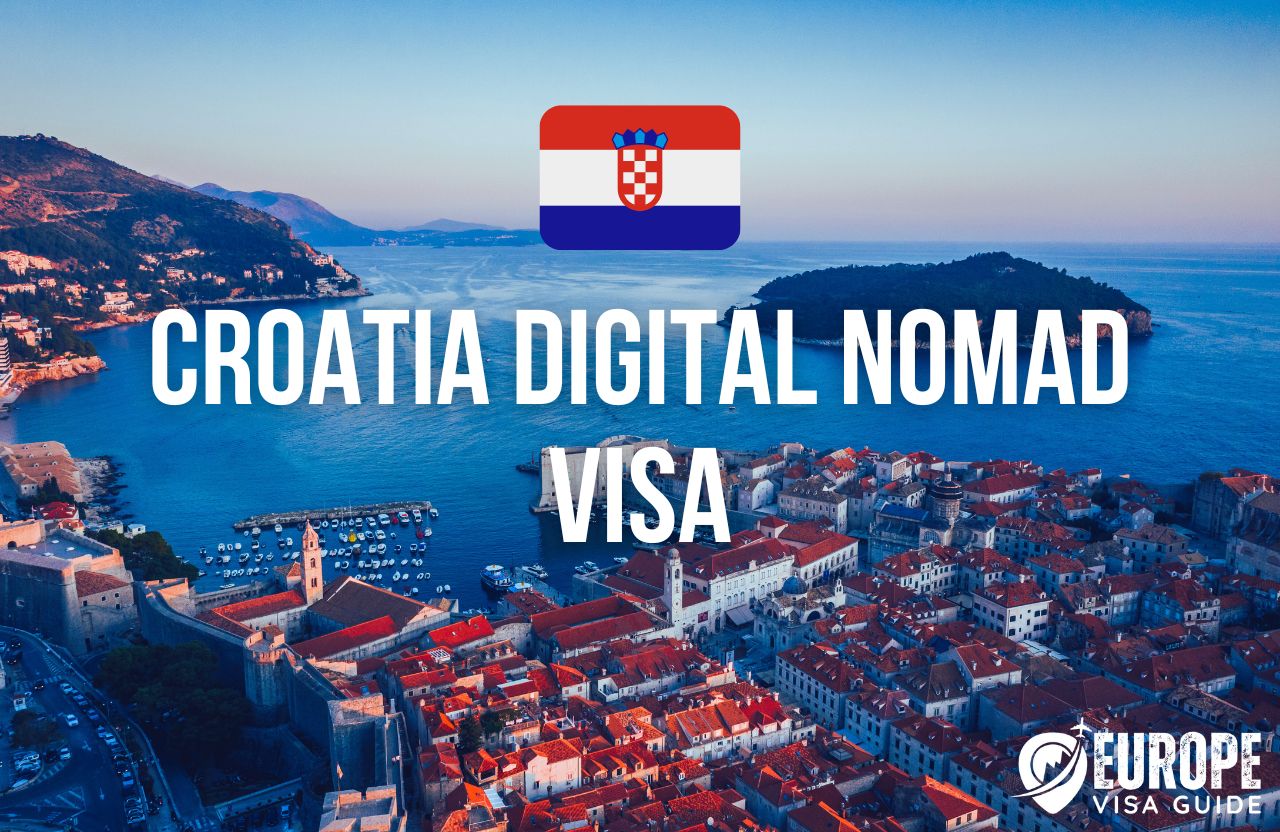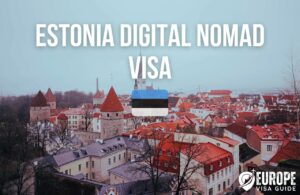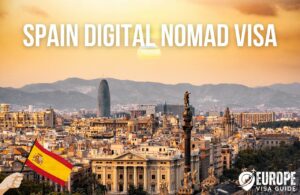
Table of Contents
Introduction
In recent years, Croatia has emerged as an attractive destination for digital nomads seeking a blend of stunning landscapes, affordable living costs, and a thriving remote work community. To cater to this growing trend, Croatia introduced the digital nomad visa in January 2021, allowing non-EU citizens to stay in the country for up to one year while working remotely. In this comprehensive guide, we will explore the eligibility requirements, application process, key benefits, and frequently asked questions regarding the Croatia digital nomad visa.
Visa Overview
Before delving into the details of the Croatia digital nomad visa, let’s first understand what it entails and why it was introduced.
What is the Croatia Digital Nomad Visa?
The Croatia digital nomad visa is a temporary stay permit that enables third-country nationals to live and work in Croatia for up to one year, provided they meet certain requirements. It is important to note that EU, EEA, and Swiss citizens are exempt from this visa requirement and can freely move to Croatia without any additional permits.
To be eligible for the digital nomad visa, applicants must demonstrate that they earn a monthly income through remote work, either as an employee or through their own company registered outside Croatia. It is crucial to refrain from providing services or working for employers based in Croatia.
When was the Croatia Digital Nomad Visa Introduced?
The idea of a digital nomad visa in Croatia was sparked by Dutch entrepreneur Jan de Jong during his visit to the country in April 2020. Recognizing the potential benefits for both digital nomads and the Croatian economy, the government worked diligently to introduce the temporary stay permit. On January 1, 2021, Croatia officially launched the digital nomad visa, welcoming its first digital nomad, Melissa Paul, just two weeks later.
Why was the Croatia Digital Nomad Visa Launched?
Croatia, like many European countries, recognized the growing appeal of digital nomads and their positive impact on local economies. By attracting remote workers, Croatia not only benefits from their spending and contributions but also enjoys an influx of diverse talent and expertise. The digital nomad visa offers a win-win situation for both the country and digital nomads seeking a unique work-life experience.
Key Benefits
The Croatia digital nomad visa comes with various advantages that make it an appealing option for remote workers. Let’s explore some of the key benefits:
- Tax Exemption: Digital nomads on the Croatia digital nomad visa are not required to pay income taxes to the country during their temporary stay. This tax exemption can lead to significant savings for remote workers.
- Affordable Cost of Living: Croatia offers a relatively low cost of living compared to many other European countries, making it an attractive destination for digital nomads looking to stretch their budget further.
- Thriving Digital Nomad Community: Croatia has seen a surge in its digital nomad community, creating opportunities for networking, collaboration, and shared experiences with like-minded individuals.
- Stunning Destinations: From historic cities to picturesque beaches, Croatia boasts a wide range of beautiful destinations that provide a perfect backdrop for work and leisure.
- Abundance of Co-working Spaces: Major cities in Croatia offer a plethora of co-working spaces, providing digital nomads with well-equipped environments to focus on their work while fostering a sense of community.
- Reliable Internet Connectivity: Croatia boasts excellent wifi coverage, ensuring that digital nomads can work seamlessly and stay connected with their clients and colleagues.
Eligibility Requirements
To be eligible for the Croatia digital nomad visa, certain criteria must be met. Let’s dive into the specifics:
Third-Country Nationals
The digital nomad visa is specifically designed for third-country nationals, meaning individuals who do not hold citizenship in the European Union (EU), European Economic Area (EEA), or Switzerland. If you belong to any of these groups, you can freely enter and stay in Croatia without the need for a digital nomad visa.
Remote Work Requirements
Applicants must demonstrate that they earn a monthly income through remote work. This can be achieved either by working as an employee for a company or by operating their own company registered outside Croatia. It is important to note that providing services or working for employers based in Croatia is not permitted under the digital nomad visa.
Monthly Income Threshold
To be eligible for the digital nomad visa, applicants must meet the monthly income threshold set by Croatia’s Ministry of the Interior. The income should correspond to at least 2.5 times the average monthly net salary paid in the previous year. Currently, this amounts to HRK 17,822.50 (approximately €2,364 or $2,506).
Alternatively, applicants can demonstrate that they have the total amount required for a 12-month stay in their bank account. This sum should be at least HRK 213,870 (approximately €28,378 or $30,079).
Document Requirements
To successfully apply for the Croatia digital nomad visa, applicants must gather and submit the necessary documents. It is crucial to ensure that all required documents are complete and accurate. Let’s take a look at the list of documents needed:
- Copy of a Valid Travel Document (Passport): Applicants must provide a copy of their valid passport, which should be valid for at least three months longer than the intended stay in Croatia.
- Proof of Health Insurance: Travel or private health insurance that covers the territory of the Republic of Croatia is mandatory. The insurance policy should be valid for the duration of the planned stay.
- Proof of Purpose: Depending on whether the applicant works for a company or owns a company, different documents are required:
- For employees: An employer’s statement confirming that the applicant works through communication technology, along with the employer’s contact information.
- For company owners: A copy of the company registration certificate and proof that the applicant performs their work through the registered company.
- Proof of Income: Applicants have three options to demonstrate their income:
- Bank statements showing the total amount required for a 12-month stay.
- Bank statements showing regular monthly income that meets the requirements.
- Payslips for the last six months, serving as proof of the required monthly income.
- Criminal Record Check: Applicants must provide evidence that they have not been convicted in their home country or any country where they have resided for more than one year before arriving in Croatia.
- Address of Stay in Croatia: Applicants can provide a temporary address from a hotel or hostel, as long as they have a confirmed reservation.
It is important to note that all documents must be submitted in either Croatian or English. Applications can be made in person at a Croatian embassy or consulate, at a local police station in Croatia, or online.
Application Process
Applying for the Croatia digital nomad visa can be done through various channels, depending on the applicant’s circumstances. Let’s explore the different application methods:
Online Application
Applicants, regardless of whether they require a visa to enter Croatia, can apply for the digital nomad visa online. If a visa is needed, applicants must apply for a Type D Visa, which has separate requirements and application procedures.
For those not requiring a visa, such as citizens of the United States, the United Kingdom, or Australia, the online application process is straightforward. Applicants should begin by contacting the Croatian embassy in their home country, as they can provide valuable guidance and instructions on the application process.
Applicants will need to fill out an online form, which will be forwarded to the appropriate police station based on the intended stay location. All necessary documents should be attached to the online form for review and processing.
Application at Police Stations in Croatia
If applicants do not require a visa to enter Croatia, they can apply directly at the local police station in the area where they plan to stay. A list of police stations and police administrations in Croatia can be obtained for reference.
Alternatively, if applicants require an entry visa, they can apply for a tourist visa to enter Croatia, and then subsequently apply for the digital nomad visa at the local police station.
In both cases, applicants must ensure that all the required documents are complete and properly organized before submitting their applications.
Application at a Croatian Embassy or Consulate
Applying for the digital nomad visa at a Croatian embassy or consulate in the applicant’s home country is also a viable option, especially for those who require a visa to enter Croatia. The process remains largely the same, with applicants contacting the embassy or consulate to obtain detailed instructions and submit the necessary documents.
If a visa is required, applicants must apply for both the entry visa and the digital nomad temporary stay permit. The embassy or consulate will provide guidance on the specific requirements for each.
After Submitting the Application
Once the application has been submitted, applicants will need to await feedback from the authorities. If the temporary stay permit is granted, applicants must register their temporary residence address at the local police station within 30 days of approval and three days from their entry into Croatia.
Additionally, applicants will need to obtain a biometric residence permit. During this step, a police officer will confirm the applicant’s identity, collect their fingerprints and signatures, and issue the residence permit.
Application Fees
The fees associated with applying for the Croatia digital nomad visa vary depending on the chosen application method. Let’s explore the different costs:
Applying at a Croatian Embassy or Consulate
Applicants who apply for the digital nomad visa at a Croatian embassy or consulate in their home country will incur the following fees:
- HRK 420 (approximately €55.73 or $59.07) for granting a temporary stay
- HRK 460 (approximately €61.04 or $64.70) for the visa itself
- HRK 310 (approximately €41.13 or $43.60) for a biometric residence card
Applying at Local Police Stations in Croatia
Applicants who choose to apply directly at a local police station in Croatia will face the following fees:
- HRK 350 (approximately €46.44 or $49.22) for granting a temporary stay
- HRK 70 (approximately €9.29 or $9.84) administrative fees for issuing a biometric residence permit
- HRK 240 (approximately €31.85 or $33.75) for a biometric residence card
It is important to note that these fees are subject to change, and applicants should verify the latest fee amounts before submitting their applications.
Bringing Your Family
If digital nomads are granted a temporary stay permit in Croatia, their immediate family members can also join them. Family members can obtain a temporary stay permit for the purpose of family reunification, provided they meet the general conditions.
To prove the family relationship, applicants should submit supporting documentation such as statements, joint rental agreements, or other relevant evidence.
Tax Considerations
One of the significant advantages of the Croatia digital nomad visa is the tax exemption it offers to digital nomads. According to Croatia’s income tax regulations, digital nomads are not obligated to pay income tax to the country during their temporary stay. This can lead to substantial savings for remote workers choosing Croatia as their base.
However, it is important to research the tax requirements of your home country, as tax obligations vary from jurisdiction to jurisdiction. While Croatia may not impose income tax, you may still have obligations in your home country.
Limitations and Future Prospects
While the Croatia digital nomad visa provides an opportunity for remote workers to experience the country’s beauty and vibrant work culture, it is important to note certain limitations. The digital nomad visa does not lead to permanent residency or citizenship in Croatia. To be eligible for permanent residency, individuals must reside in the country for at least five consecutive years.
Once the digital nomad visa expires, individuals must leave Croatia and wait for six months before reapplying for another temporary stay permit. While this visa offers flexibility and an enriching experience, those seeking long-term plans in the European Union, including permanent residence or citizenship, may find alternative options in countries like Portugal.
Frequently Asked Questions
Can I apply for the digital nomad visa from within Croatia?
Yes, it is possible to apply for the digital nomad visa from within Croatia. Being in the country can simplify the process, allowing applicants to act promptly upon receiving approval. Applications can be submitted at the local police station or through the online application system.
How long does the processing time take?
The typical processing time for digital nomad visa applications is around one month. However, in certain cases, it may take up to 12 weeks for the authorities to process the application and issue the temporary stay permit.
Do digital nomads pay taxes in Croatia?
No, digital nomads on the Croatia digital nomad visa are exempt from paying income tax in the country. However, it is essential to research the tax regulations of your home country, as tax obligations may still apply there.
What is the best place to stay as a digital nomad in Croatia?
Zadar is widely regarded as one of the best places to stay as a digital nomad in Croatia. It is home to the country’s first digital nomad village, providing an inspiring and supportive environment for remote workers. Even if you cannot stay in Zadar for the entire duration of your visit, a visit to this vibrant city is highly recommended.
Can the Croatia digital nomad visa be extended?
No, the Croatia digital nomad visa cannot be extended. Once the permitted stay period comes to an end, individuals must leave the country and wait for six months before reapplying for another temporary stay permit.
Conclusion
The Croatia digital nomad visa offers an exciting opportunity for remote workers to experience the beauty of Croatia while continuing their professional pursuits. With its stunning landscapes, affordable living costs, and thriving digital nomad community, Croatia has become a sought-after destination for digital nomads worldwide. By following the eligibility requirements, gathering the necessary documents, and submitting a complete application, individuals can embark on a fulfilling digital nomad journey in Croatia.
While the digital nomad visa does not lead to permanent residency or citizenship, it provides a unique opportunity to immerse oneself in Croatian culture and enjoy the country’s many attractions. Whether you choose to work from historic cities or relax on pristine beaches, Croatia offers a truly enriching experience for digital nomads seeking adventure and professional growth.
If you’re ready to embark on your digital nomad journey, explore the possibilities offered by the Croatia digital nomad visa. Discover the breathtaking beauty of Croatia while enjoying the freedom and flexibility of remote work. Start your application process today and experience the best of both worlds in this captivating European country.





